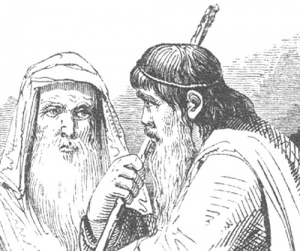Jethro: Difference between revisions
No edit summary |
No edit summary |
||
| Line 1: | Line 1: | ||
The Midianites were the descendants of Midian, who was a son of Abraham through his wife Keturah. This can be seen in the following Biblical passages. [[Genesis 25]]:1-2 1 | [[File:JethroMoses.jpg|right|thumb|Did [[Jethro]] worship [[Balaam]]? Do you?]]The Midianites were the descendants of Midian, who was a son of [[Abraham]] through his wife Keturah. This can be seen in the following Biblical passages. [[Genesis 25]]:1-2 1 | ||
The Midianites had an apparent religio-political connection with the Moabites were believed to worship a multitude of gods. There appears that some of Midianites worshipped Baal-peor and the Queen of Heaven, Ashteroth. | The Midianites had an apparent ''religio-political'' connection with the Moabites who were believed to worship a multitude of [[gods]]. There appears that some of Midianites worshipped Baal-peor and the Queen of Heaven, Ashteroth. | ||
There was also an Egyptian temple of Hathor at Timna whih continued to be used during the Midianite occupation of the site. However, whether Hathor or some other deity was the object of devotion during this period is impossible to ascertain. | There was also an Egyptian temple of Hathor at Timna whih continued to be used during the Midianite occupation of the site. However, whether Hathor or some other deity was the object of devotion during this period is impossible to ascertain. | ||
Revision as of 10:12, 29 January 2017

The Midianites were the descendants of Midian, who was a son of Abraham through his wife Keturah. This can be seen in the following Biblical passages. Genesis 25:1-2 1
The Midianites had an apparent religio-political connection with the Moabites who were believed to worship a multitude of gods. There appears that some of Midianites worshipped Baal-peor and the Queen of Heaven, Ashteroth.
There was also an Egyptian temple of Hathor at Timna whih continued to be used during the Midianite occupation of the site. However, whether Hathor or some other deity was the object of devotion during this period is impossible to ascertain.
Therefore, even though the Midianites in general didn't worship the God of Israel, enough knowledge of Him must have existed among them for Jethro, Moses' Father-In-Law, to make the following statement after hearing about the Exodus, and God's miraculous freeing of the Jewish People from their Egyptian bondage:
- "And Jethro rejoiced for all the goodness which the LORD had done to Israel, whom he had delivered out of the hand of the Egyptians. 10 And Jethro said, Blessed be the LORD, who hath delivered you out of the hand of the Egyptians, and out of the hand of Pharaoh, who hath delivered the people from under the hand of the Egyptians. 11 Now I know that the LORD is greater than all gods: for in the thing wherein they dealt proudly he was above them. 12 And Jethro, Moses’ father in law, took a burnt offering and sacrifices for God: and Aaron came, and all the elders of Israel, to eat bread with Moses’ father in law before God." Exodus 18:9
The Kingdom of God is from generation to generation". And any and all generations may go into apostasy if they unmoore the rituals of religion from its purpose and precept.
Most people today do not understand words like worship or religion as used in history nor the purposes and functions of temples and priests.
Today, most of the functions of those temples is now provided through public religion. The early Church established by Jesus the Christ was providing the service that the modern Christian now go to the government of the world to obtain.
The Christian conflict with Rome was because they were willing to die rather than sign up for the benefits of their free bread and circuses which was the welfare of the State.
Today, modern Christian are back in the bondage of Egypt because of sloth and covetousness.
They have committed the error of the Nicolaitan and Balaam.
Religion |
Pure Religion |
Private welfare |
Fleeing Religion |
False religion |
Public religion |
Our Religion |
Christian conflict |
Corban |
Baptism |
Benefactors |
That Word |
Daily ministration |
Modern Christians |
Diocletianic Persecution |
Christians check list |
gods |
Judge not |
Judge |
Fathers |
Deist |
Damnable heresies |
Factions at the altar |
Pharisees |
Sadducees |
Zealot |
Essenes |
Levites |
Messianic Judaism |
Menahem the Essene |
Sanhedrin |
Altars |
Clay and Stone |
Red Heifer |
Golden calf |
Freewill offerings |
Religion |
Pure Religion |
Public religion |
Christian conflict |
Paganism |
Denominations |
Dispensationalism |
Benefactors |
Corban |
Daily ministration |
Calendars |
Cult |
Imperial Cult of Rome |
Guru theories| |
Covet |
Merchandise |
Mark of God |
Mark of Cain |
Mark of the Beast |
Nature of the Beast
Section 666 |
Benefactors |
Biting one another |
Cry out |
Worship |
Church |
Temples |
Religious Orders |
Priests |
Kings and priests |
Hear |
Bible Index |
Network |
If you need help:
- Or want to help others:
Join The Living Network of The Companies of Ten
The Living Network |
Join Local group |
About |
Purpose |
Guidelines |
Network Removal
Contact Minister |
Fractal Network |
Audacity of Hope |
Network Links
Hue and cry |
Go and cry |
Cry out |
Employ |
Land |
Mind |
Corban |
Christian conflict |
Nicolaitan |
Religion |
Pure Religion |
Welfare types |
Daily ministration |
Self-Sacrifice |
Repent |
Weightier matters |
Altars |
Sophistry |
Friend |
Stones |
Forgiveness |
Forgive |
Forgive them |
In need of forgiveness |
Wantonness |
Covet |
Negotiating Health Care Costs |